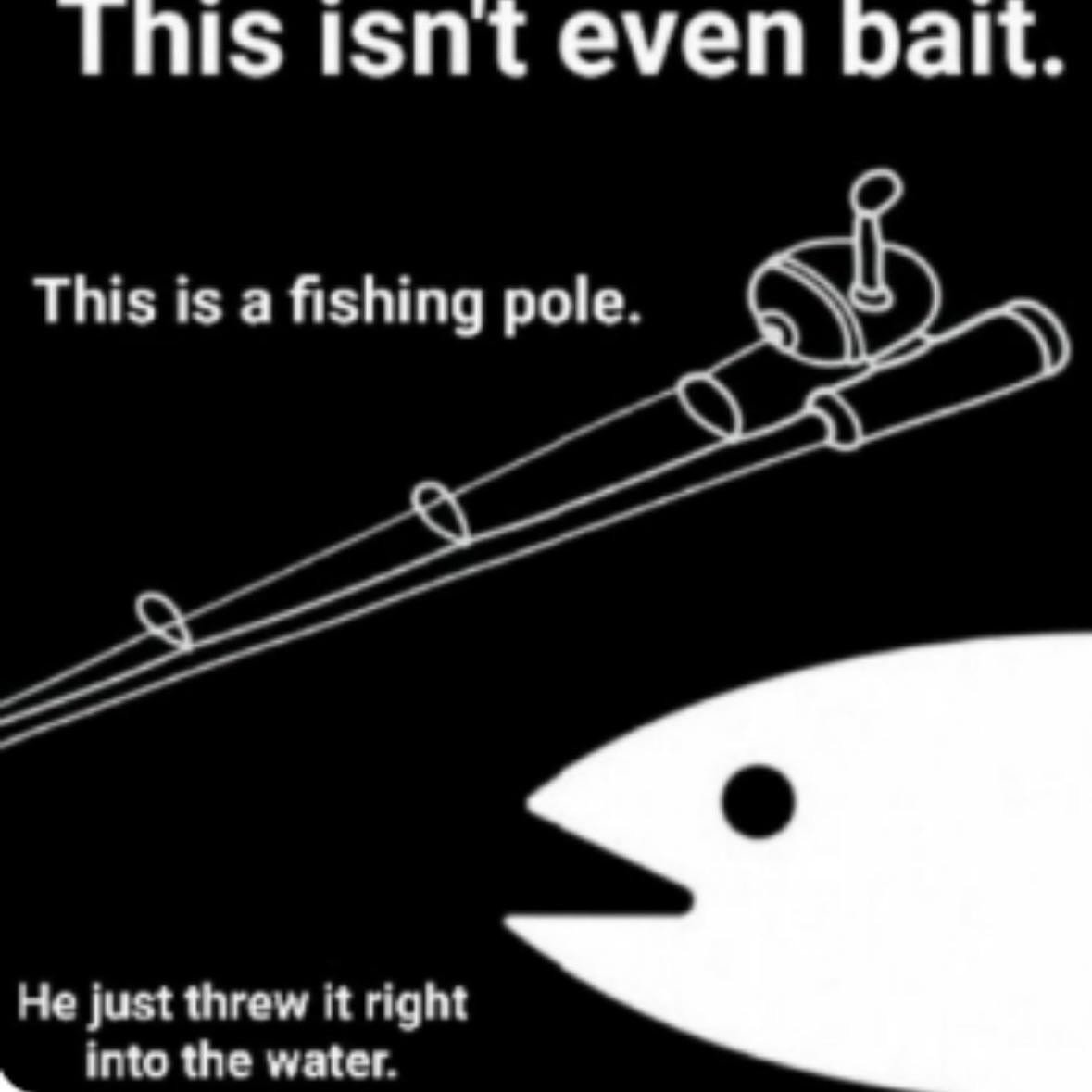The reason they do dumb shit like this is to distract from the evil shit they’re doing.
The crazy part is it clearly still works from what people are commenting
Believe it or not, a lot of us are able to be mad about more than one thing at a time. This one just happens to be both exceptionally stupid, exceptionally visible, and easy to resist without having to advocate for violence.
Believe it or not, a lot of us are able to be mad about more than one thing at a time.
You can, I can, lots of people can.
But not everyone, and certainly not the media. They only have so much airtime, it’s a zero sum game. And so is attention on a personal level.
What you’re doing is like being in a room and saying “none of us are stupid enough to vote trump. No one is that stupid”.
While ignoring that obviously lots of people were dumb enough to vote for him.
You (and lots of others) desperately need to realize that people think differently than you do. Because not realizing that hasn’t been working out well for us as a society
“Resistance”
This will do nothing.
Yeah some intern is going to spend 3 minutes deleting all reports for the Gulf of Cuba
Then an engineer will automize it
I don’t really understand why Google would care, tho.
It’s not like they are bound by a public vote or something, and you show them that you still use their Product .__.
As a way of managing disputed borders and names in other parts of the world, Google will present the official borders in the country that they are in and show the dispute in other countries. This keeps Google in good graces in all countries they operate in.
The US Federal Government has officially changed the name of the Gulf of Mexico to the Gulf of America, so Google is implementing the same policy here.
Cool. I don’t sympathise at all. They could stand but they choose to bend a knee to tyrants. It’s no inconvenience to me to use alternatives to their products, as I’m sure it’s no inconvenience to them that I do so. It’s a peaceful solution all round.
Why should Google be the one who decides what is true?
I’m not saying a government necessarily is better (though I would think it is in most cases) but is it better to trust a private for profit company over a government?
You are asking a private company to decide national borders and names.
Boy are you insane
I’d use the open source ones but I haven’t found one that handles transit schedules in my area yet. I’d be open to suggestions on that.
But outside the US we’re still shown the propaganda name inside parenthesis. There’s no dispute here. There’s only one real name.
what we have to resist here is the urge to engage with this sort of bullshit. the actual resistance is in ignoring this and focusing on what actually matters
Petition to add an acute accent (México) and change the official pronounciation
Lol this is not resistance
Try unionizing or mutual aid. Hell even using open streetmaps is atleast something
Exactly.
Start building community or start building bombs. Bring people together or blow them apart.
Those are your choices now. Either that or crawl in a hole and die.
Doomerism will doom us all. Fatalism is fatal.
You want to give up and die? Fine. Rope is cheap. Go do it and spare us your sniveling.
I’m sorry it’s shit like this that makes people not take anything you guys do or say seriously.
Submitting a report over a name change they didn’t choose and then tagging your post with “resist” is just pathetic.
Yes, the renaming of the Gulf is stupid. No, submitting a report that Google is going to ignore entirely isn’t “resisting” anything. It’s just a waste of your time and energy.
I keep seeing posts taking about how Trump and the right are “flooding the zone” with bullshit to distract everyone. This is exactly what they are talking about. You gotta stop taking the bait every single fucking time.

Any suggestions on how I could have spent those 15 seconds more effectively? Serious question, would prefer to be resisting with greater impact.
Sometimes resisting requires more than 15 seconds of your time.
If you are serious, look closely at how you spend your money. Look at what companies make/sell you shit and then take your money and give it to the fascist regime. This can be done with a quick Google search or using an app (GoodsUniteUs seems to be ok, hopefully someone can recommend another).
You don’t have to give up your car, cell phone, flat screen TV, etc. Just check one or two items in your grocery cart each trip. Maybe you can spend thirty cents more to buy from a company that doesn’t have a history of financing the craziest of the Republican party.
As you start making small changes it’ll be easier to just stop supporting them out of habit.
Sometimes resisting requires more than 15 seconds of your time.
Right, exactly. It seemed strange to see people acting as if spending 15 seconds of idle time on one’s phone to do a goofy little “resistance” act described in the original post was somehow actively harming any kind of meaningful resistance. I wondered if there was some quick and easy yet somehow far more effective action I could have taken during those few moments.
I’ve de-googled, forsaken Amazon, embraced Linux and open source free software (rather than apple/Microsoft etc.), tried to be aware of bad companies like Nestlé and not buy their stuff, stood with signs, protested, pestered politicians, done my best to stir up unrest against the ridiculously awful things going on. I’m hoping to find more I can do, I am by no means an expert at this stuff, I’m learning as I go. But I think I’ll still also have the time to do derpy little things like nag Google with feedback while sitting on the can browsing Lemmy.
Good on ya. Hopefully we can get others to start doing the same. It’s really not that hard once you get started.
My concern is that dumb stunts like this will actually make it harder. I doubt they are just going to change it back. More likely they’ll just stop taking feedback if it’s truly making things difficult for them.
Yeah, my impression was that it was more about contributing to a statement of some kind than actually expecting this feedback alone would cause Google to change it back.
I can see how there could be worry over some people thinking this is all it takes, and considering their resisting achieved after just one token action instead of going on to do other stuff as well.
Stay strong my long-necked ally, let’s all build one another up!
All that will do is waste your time. Find something less petty that will make a difference,because this ain’t it.
Getting off of Google as much as possible is the way to go.
Eh, I bet those reports go straight to the same
/dev/nullthat receives youtube reports from real people. I guess all we can realistically do is spam gemini with long prompts in order to cost them extra money.
You can also give the “Gulf of America” a rating on Google maps. I gave it one star and left the comment “it used to be 5 star but new management ruined it.”
Yet another reason why corporations cannot be trusted. Gotta switch to OpenStreetMap now.
May I be so bold as to suggest an alternative?
!degoogle@lemmy.mlYou’re gonna have to do it eventually. Take advantage of the outrage you’re feeling and get it done now. Won’t take long for Google to become a direct government surveillance tool.
They are too big to care about user feedback at this point.
I know for more deeply integrated people de-googling can be a huge pain, but I’ve really enjoyed the process. It’s somehow enjoyable finding and exploring alternate solutions with their own setups and features, and settling on things that don’t make you feel gross to use.
I just wish there was a good alternative to Youtube, but nothing has the same userbase. And frankly half of them wouldn’t want me
YouTube and Voice are the two I haven’t found great alternatives for. Odysee seems like it might have potential for video stuff? And I use a Peertube instance for uploading videos, but people will only ever see those if I send them the link; it doesn’t have the community/discoverability aspects. Not that I’m looking to be discovered, but I can see how it isn’t particularly viable for people who are.
Hahaha, the feedback button goes directly to the trash.
I’m not sure if this will be effective, or if this will be the type of thing that will be swept away by a filter or AI processing, but I feel like it’s right for us to push against this horseshit.
As they say, “The devil’s in the details”. Every little bit helps to remind the oligarchs that we’re fed up with their bs.
Not if some underling just applies a filter so no one ever gets to see it.
I guess it costs them a negligible amount of money as there’s server time involved.
If you were the opposition trying to waste the time of your opponents.
Having them dedicate hundreds or thousands of hours of work to generate reports that could be filtered in 2 minutes by a single employee would probably be near the top of the list.
That’s why these kinds of suggestions are actively harmful. It wastes people’s time and leaves them less motivated to do actual, impactful, things.
I’m open to better ways of spending 15 seconds of idle Lemmy time that will have a greater resistance effect. Any suggestions?
Downvote these threads to prevent the aformentioned loss of hundreds or thousands of collective hours on a fool’s errand and then spend the other 13 seconds meditating for your own mental health.
Sundar Pichai , Google’s CEO, sat at his desk, sipping his morning coffee as he scrolled through the Google Maps feedback reports on his phone. His eyes landed on a feedback report from Paula Kampf.
At first, Sundar chuckled at the report’s absurdity. But as he continued reading, his expression changed from amusement to concern.
This user was actually trying to tell him something. That Google’s search results were inaccurate and misleading. That people were getting confused between the Gulf of Mexico and the Gulf of California (not to mention other gulf-related terms). Sundar realized that his team had been so focused on pushing updates and innovations that they’d forgotten about the importance of accuracy.
He called an emergency meeting with his top executives to discuss the issue. They poured over the data, and it became clear that the problem was widespread. Google’s algorithms were prioritizing relevance over accuracy, leading to a sea of irrelevant results.
Sundar knew he had to act fast. He decided to make a bold change: he would overhaul Google’s search engine from the ground up. The new algorithm would prioritize accuracy and relevance, using machine learning to improve its results over time.
The team worked tirelessly to implement the changes, testing and refining their approach every step of the way. And when they finally launched the updated search engine, something amazing happened.
People began to rave about Google’s newfound accuracy. The user who had posted that tweet was overjoyed to see “Gulf of Mexico” come up in the top results. Others praised the changes, saying it had helped them find the information they needed more easily.
But Sundar didn’t stop there. He realized that the issue went beyond just search engines. Google’s influence extended far into various industries, from education to finance. So, he decided to take a broader approach.
He launched Google.org, a new initiative dedicated to promoting digital literacy and accuracy across all aspects of online life. The program provided resources and training for schools, non-profits, and individuals, helping them navigate the complexities of online information.
The impact was staggering. Digital literacy rates skyrocketed, and people began to critically evaluate online sources with ease. Google’s search engine became just one piece of a larger puzzle, working in tandem with other platforms and initiatives to promote accuracy and understanding.
As Sundar looked out over the city, he felt a sense of pride and accomplishment. He had taken a seemingly trivial tweet and turned it into something much bigger than himself. The future was bright, and Google was leading the way, and it all started with that one Feedback report from Paula Kampf.
I guarantee you that they have all error reports for the Gulf of Mexico automatically routed to /dev/null. No one is going to see them.
This isn’t how Google works, the reports will go to a bunch of poor guys working 12 hour shifts in India









